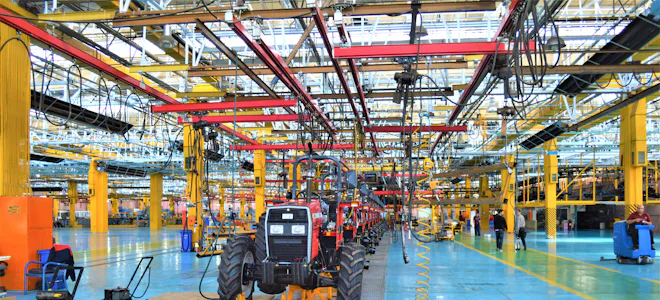UK Manufacturing is thriving
Table of Contents
Contrary to widespread perceptions, the words of headline writers and the gloom of some pundits, the UK manufacturing sector is thriving. The UK is not only currently the world’s eighth largest industrial nation – if its current growth continues, it will break into the top five by 2021.
The statistics tell the story. Britain has been a manufacturing powerhouse for around 250 years and, despite an apparent decline since the 1970s when manufacturing contributed 25% of UK GDP, UK manufacturing today makes up 11% of GVA, 44% of total UK exports totalling £275bn, 70% of business R&D, and directly employs around 2.6 million people.
The tremendous rise of the services sector in the past 50 years has obscured the fact that UK manufacturing is actually growing in value, and has done so at an average of 1.4% a year since 1948, according to a recent report from the Office for National Statistics (ONS).
There are many reasons why. A more highly-skilled workforce, a shift in production from low to high value goods, improvements in automation and technology, increased investment in R&D, and a more integrated global economy have all contributed to the success story. The world wants to buy goods made in the UK. Manufacturing is central to the UK economy in itself and, moreover, supports a huge range of services, such as catering, cleaning, security, logistics and more.
What about the challenges?
Of course, the outlook for manufacturing is not entirely without stormy weather – many of them due to Brexit. Many manufacturers say their strategic planning is being made more difficult by Brexit uncertainties, especially concerning workforces and the availability of skilled people if free movement comes to an end.
The sector also faces further crisis from a growing skills gap, with older members of the workforce retiring and an insufficient number of properly trained young people emerging from the education system. The lack of trained people has grown so bad that companies are now establishing their own training schemes and academies.
There could also be issues with finance. There could still be a hangover from the crash of 2008, with manufacturers reluctant to seek bank funding - and, equally, banks wary of lending, particularly to smaller manufacturers.
Some sector statistics:
Aerospace
- £31bn annual turnover - 90% to export markets – worth £26bn - 18% global market share second globally to the US
- 30% productivity growth in the past five years
- 39% growth since 2010
- Almost a decade’s worth of work in hand, with an order book of more than 13,000 aircraft worth up to £195bn to the UK
Automotive
- £71.6billion annually, with £34.3bn of exports –12% of the UK’s total manufactured export
- More than 2000 firms supplying the sector – including world leading technology specialists
Chemical and Pharmaceutical
- Annually £15.2bn contribution to the UK economy - £60m to the UK balance of trade on a daily basis
- The UK’s largest manufacturing export sector (split £24.7bn – Chemical and £20.7bn – Pharmaceutical)
- CIA members have a combined turnover of £50bn
Construction
- Annually adds £92bn+ to the UK economy – represents 6.4% of the total economic output
- 35+% of construction employees run their own companies
- More than a quarter of employers have recruited a school leaver in the past 2-3 years
Defence
- £24bn annual turnover - the UK is the world’s second biggest defence exporter generating an average of £7.7bn every year
- 18% growth since 2010
- 34% export growth between 2009 – 2013
- 9,000+ defence companies including SMEs exist in the UK
Electronics
- £78bn annual turnover - the world’s fifth largest in terms of production
- 95%+ of the sector’s 6,000 businesses are SMEs
- 14 of the world’s top 20 semiconductor companies have design or manufacturing sites in the UK
Energy
- Annually adds £5.5bn to the UK economy
- The energy sector reduced its carbon emissions by 13% in 2015 – while generation from renewable sources increased by 30% from 2014 to 2015
Food & Drink
- Exports worth £12.8bn a year - adds £21.9bn to the UK economy - accounts for 16% of total UK manufacturing turnover
- Productivity has increased by 11% over the past five years
Making big businesses bigger
The value of UK manufactured goods continues to grow but, since 2009, the growth of productivity has been negligible – while industrial rivals such as Germany, Spain and Italy have seen productivity grow strongly.
But increasingly, there is agreement that the solution is investment in digitalisation, including automation, machine learning and Big Data analytics. The return on that investment can be seen in closer customer relationships, greater perceived value, more engaged employees – and on the bottom line with increased revenues and decreased costs.
So what is standing in the way of digitisation of the manufacturing process?
It seems that the answer is simply a matter of finding the necessary funding. At Rangewell, we can help manufacturing businesses across all sectors find the funding they need to adopt automation and new digital solutions which will help them to drive down their costs - and make them even more successful.
We know that automation can be a long-term project and that, for it to succeed, you may need a long-term funding solution. We can help you find the solutions scaled for your needs. To find out what those solutions could mean to you, simply contact a Rangewell Industrial Finance Specialist on 020 3318 2613.

